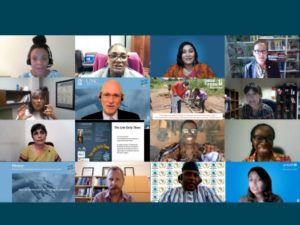Annual Water and Health Conference Convenes Global Experts to Learn and Share the Latest on Water
December 2, 2021
Gillings School of Global Public Health

The virtual sessions brought experts in government and nongovernment sectors from around the world.
The Water and Health Conference hosted by the Water Institute at the UNC Gillings School of Global Public Health has now become the world’s largest annual international conference on water and health. This year’s conference, which was held virtually for the second time ever, ran from October 4–8, and it brought together stakeholders from 122 countries around the world to advance their shared goal of increased access to water, sanitation and hygiene (WASH) worldwide. More than 3,700 people registered for virtual sessions.
“In many respects, the meeting sets the research agenda for the WASH community,” said Aaron Salzberg, Jennifer and Don Holzworth Distinguished Professor of environmental sciences and engineering at the Gillings School and director of the Water Institute. “We do this by identifying emerging challenges and by listening to the challenges faced by practitioners and policymakers in the field.”
Since it was founded in 2009, the Water Institute’s primary goal has been to generate evidence that drives improvements in practice and policy – to inform the way the world works on WASH. The pursuit of universal access to WASH services that are safe, affordable and sustainable promises to improve public health, and the Water Institute is accelerating progress toward these goals. The Water and Health conference brings together policymakers, practitioners and researchers to review the results of these efforts along with the latest research to improve strategies to further expand access to WASH. Salzberg, who previously served as the United States’ first special coordinator for water, stresses the increasing importance of international collaboration around water issues for health and international stability.
“We can’t solve Africa’s water challenges in laboratories here in the United States,” he said. “We need access to scientists and practitioners who are on the ground, to inform our research and to test the ideas that we develop. Creating these synergies across the globe will be essential to our achieving meaningful results at scale.”
Typically held in the United States in Chapel Hill, North Carolina, the conference was moved to an online format last year, in response to the COVID-19 pandemic. This format was found to reduce barriers to attendance, making the conference more inclusive and leading to record levels of attendance.
The 2021 conference retained core elements of past conferences, while seeking to maintain the 2020 trend of increased enrollment that the virtual format enabled. It included plenaries to explore emerging themes, side events that provided collaborative learning experiences around new and emerging practices, and verbal and poster presentations to discuss the latest research.
In one side event, leaders of local and national governments shared their experience forming sustainable partnerships to provide WASH services. Other sessions discussed issues related to decentralized sanitation systems and water supply in rural areas, adapting systems in response to climate change and support for menstrual health.
Some of the timeliest sessions explored the role of WASH in current U.S. policy and lessons from monitoring wastewater for pathogens during the pandemic. Several presentations focused on the wellbeing of sanitation workers and the sustainability of their jobs. The Conference plenary sessions were among the most highly attended covering issues ranging from the future of WASH services (Is there a Future for WASH?), to inequalities in WASH access in developed countries (Why do WASH Inequalities Endure in High Income Countries?), to building the political will for sector reform at the global level (Moving from Science to Action: Demonstrating Leadership in the WASH Sector).
Since its founding, the Water Institute has tackled issues of central importance to global public health through policy, programming and practice. Its researchers have published numerous scientific papers and reached large audiences with knowledge products that translate insights into practical action. The Institute’s recommendations have supported policymaking and helped shape agendas around water supply and quality, sanitation and sewerage, environmental health in health care and school settings, and human rights.
